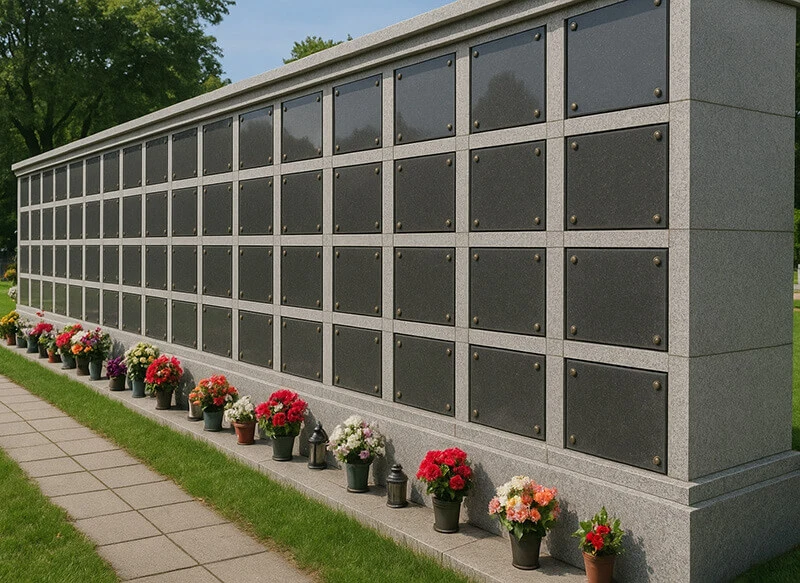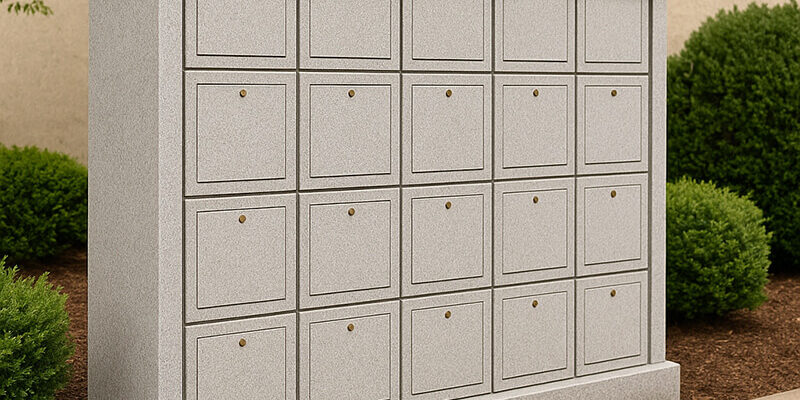What is a Private Columbarium?
Understanding the Basics
A private columbarium is a special building or room that holds cremated remains. The word comes from Latin. It means “a place for doves.” People chose this name because the small spaces in a columbarium look like the holes where doves nest.
When someone dies and their body is cremated, the ashes go into a container called an urn. A columbarium has many small spaces called niches. Each niche holds one or more urns. Think of it like a wall of small cubbies, but for urns instead of books.
Private vs. Public Options
A public columbarium sits in a cemetary where anyone can buy a niche. A private columbarium is diffrent. It belongs to one family or a small group. Some families build them on their own property. Others create them in a private garden or special location.
The main benefit is control. Families can visit whenever they want. They don’t need to follow public cemetary hours. They can decorate the space. They can add personal touches that matter to them.
A Real Example
Maria Rodriguez lost her grandmother in 2019. Her family is from Mexico. They wanted a place to honor their grandmother that felt like home. They built a small columbarium in their backyard in Arizona.
The structure holds eight niches. Maria’s grandmother was the first person placed there. The family painted the walls with bright colors. They added flowers that her grandmother loved. They hung photos and small religious items. Every Sunday, the family gathers there to remeber her.
“It feels right,” Maria said in a 2020 interveiw. “She is with us. We can talk to her. We can share our lives with her.”
Why People Choose This Option
According to the National Funeral Directors Assn. (NFDA), cremation rates in the US reached 57.5% in 2021. The Cremation Assn. of North America (CANA) predicts this number will hit 78.8% by 2045. As more people choose cremation, they need places to keep the remains.
Some families don’t want to scatter ashes. They want a permanant location. A private columbarium gives them this option. It creates a physical place where future generatons can visit.
Types of Private Columbariums
Private columbariums come in many forms. Some are small outdoor structures made of stone or brick. Others are indoor spaces in a home or a seperate building. Some families use an existing shed or garage and convert it.
The size depends on family needs. A small family might need four niches. A large, extended family might want twenty or more. The design can be simple or elaborate. Some include benches for sitting. Others have gardens around them.
Legal Considerrations
Before building a private columbarium, families must check local laws. Many cities and counties have regulations. Some areas require permits. Others have zoning rules about what you can build on residential property.
In some states, you cannot keep cremated remains on private property for long periods. Other states allow it but have specific requirements. For example, California Health & Safety Code Section 7110 addresses the disposition of cremated remains. It gives families options but includes certain restrictions.
The Consumer Info. Center recommends checking with local authourities before starting construction. A lawyer who specializes in estate planning can help navigate these rules.

Cost Factors
Building a private columbarium costs less than buying multiple burial plots. Cemetery plots in the US can cost $1,000 to $4,000 each, according to the Natl. Funeral Directors Association. A private columbarium might cost $3,000 to $15,000 to build, depending on size and materials.
The initial expense is higher, but it covers multiple family members. Once built, there are no ongoing fees. No maintainence charges from a cemetery. No annual costs for upkeep.
Maintanance and Care
Families must maintain their private columbarium. This includes cleaning, repairs, and weather protection. Stone and brick structures last longer but cost more. Wood structures need more maintainance but cost less to build.
Some families assign one person to oversee the space. Others share the responsibility. The key is having a plan so the columbarium stays in good condition for future generations.
Emotional Benefits
A private columbarium provides comfort during a difficult time. It gives families a specific place to grieve. Children can learn about their ancestors. Grandparents can share stories about those who passed away.
The space becomes part of family tradishuns. Some families gather there on holidays. Others visit on birthdays or anniversaries. These rituals help people process loss and maintain connections to loved ones.
Making the Decision
Choosing a private columbarium is a personal decision. It requires planning, money, and commitment. Families should discuss it together. Everyone should have input about design, location, and rules for use.
Consider future needs. Will the space accomodate more family members? What happens if the property is sold? Who will maintain it in twenty or thirty years? These questions matter.
A private columbarium offers a unique way to honor those who have passed. It combines practicality with personal meaning. For families who want control over their final resting place, it provides a valuable alternative to traditional options.







